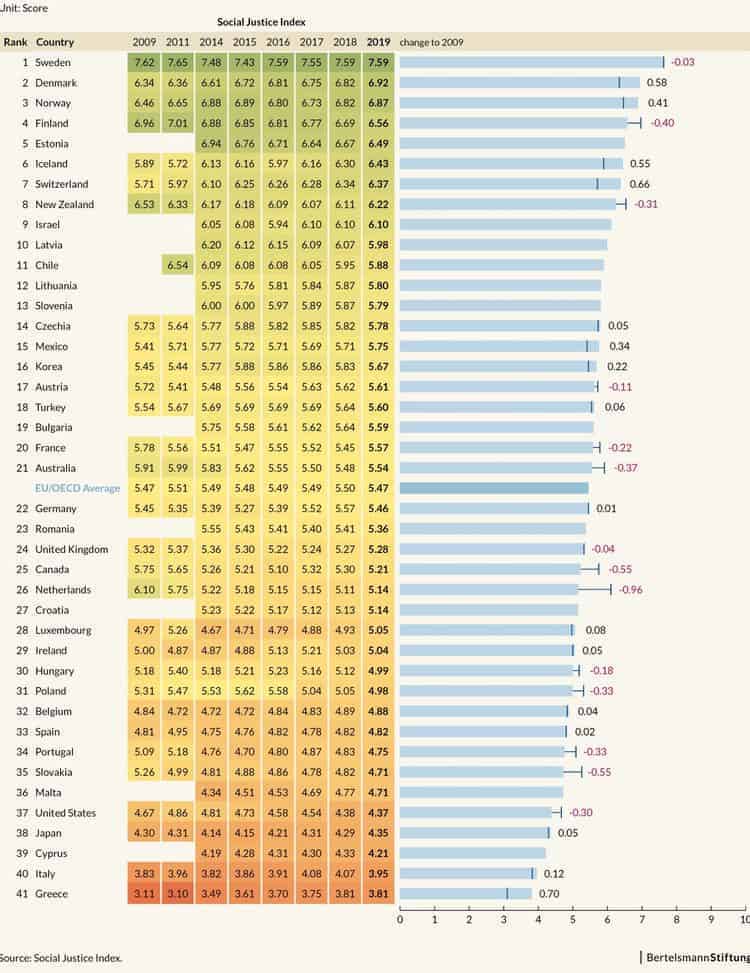Through the Fridays for Future protests, young people vent their frustration with political short-sightedness—yet little is being done to tackle inter-generational injustice.
While young people around the globe have rattled politicians with loud calls to safeguard their futures and combat global warming, the recently published Social Justice Index (SJI) reveals that over the past decade most industrial countries have done little to close the gap between young and old. This inaction jars with the urgent need to address issues such as ageing societies—in particular, the onus placed on younger generations by climate change and growing financial burdens.
Indeed, more than half of the 41 members of the European Union (EU) and the Organisation for Economic Co-operation and Development (OECD) have even recorded slight declines in inter-generational justice in recent years. There are however major differences between the countries in their efforts to balance fairly the interests of younger and older generations (see table at bottom).
Future blighted
Millions of young people have taken to the streets worldwide to protest against environmental degradation and climate change, which will blight their future. Although many of the SJI’s experts point to a growing political tendency to take environmental concerns more seriously, no step change has been achieved in advancing environmental sustainability.
The sad truth is that in 19 of the 41 countries assessed greenhouse-gas emissions actually increased from 2017 to 2018. Australia, the United States and Canada, which continue to emit nearly 20 metric tons of greenhouse gases per capita, are among the biggest polluters.
In general, we see a large divide when it comes to climate change and environmental protection. On one hand, we have ambitious countries such as Sweden, which has steadily reduced its greenhouse-gas emissions to 5.24 metric tons per capita and is expanding its share of renewable energy. On the other, we have the countries that do too little to curb the impact climate change and environmental degradation will have on future generations.
The latter are clearly in the majority. Only three of the 41 countries included in the sample obtain more than 50 per cent of their energy needs from renewable sources.
The diminishing prospects for young people are not only reflected in the lack of climate action. In all industrial countries, low birth rates and higher life expectancy are increasing the proportion of people who are no longer of working age. Part of the challenge in ageing societies is the increasing risk of poverty among the elderly and growing financial insecurity for younger and future generations.
To safeguard a state in the long run, it is just as crucial to have a sustainable pension policy as a strong family policy. Yet in many countries efforts to cope with demographic changes are scant. While policies often focus on the interests of the older population, the Nordic countries generally don’t baulk at introducing necessary reforms. In Denmark, for example, the government has begun linking the pension age to rising life expectancy.
Breathing room
Sustainable fiscal policies are key to ensuring justice between generations. High debt levels, for example, will spell enormous financial burdens for younger generations. A large number of countries have once again been able significantly to reduce their debt levels since the crisis, thereby creating the financial breathing room needed for present and future generations. Nonetheless, we observe continued high levels of debt, particularly in Japan, the US and the crisis-stricken countries of southern Europe. Greece, for example, has the second highest debt ratio, 183.3 per cent of gross domestic product (GDP), following a rise of four percentage points from 2017.
With an extremely high ratio of 237.1 per cent of GDP, Japan’s debt weighs heavily on future generations. Within the context of its demographic structure, this looks even more worrying when calculated per child. In that case, the debt currently amounts to 816,000 international dollars for every child under 15. The scope for urgent, future-oriented investments available to present and coming generations in such countries is severely limited.
It is not simply a country’s debt, however, which determines its financial sustainability. Future-focused investments, such as in research and development, contribute to inter-generational equity by fostering innovations necessary for competitiveness. In addition to the top performers of Israel and Korea, Sweden, Switzerland, Austria, Denmark and Germany feature comparatively high expenditures on R&D. In contrast, Bulgaria, Romania, Malta and Cyprus lie at the bottom of the ranking, with less than 0.3 per cent of GDP spent in this arena from the public purse.
A growing gap between young and old is also reflected in the risk of poverty. In two thirds of the industrial countries, including those with a strong welfare state, more children and youth are threatened by poverty than those over 65. In Sweden, for example, the poverty risk for under-18s is 12.3 per-cent—nearly two and a half times that for those over 65. In Norway and Denmark this relative risk of poverty for children and youth is even six and four times as high, respectively. Poverty among the elderly however remains a widespread problem in many EU and OECD countries, and there have been clear signs of an increase in old-age poverty as a result of growing demographic pressure.
For the future of the industrial countries it is vital to provide young people with good prospects and to split resources fairly between generations. To restore inter-generational justice, it is of utmost importance to halt environmental degradation and climate change. Meanwhile, looking ahead, it is key to share the financial burden between the generations and make future-oriented investments. If the industrialised countries continue at this pace, the younger generations will be dealt a bad hand for their future.
Inter – generational justice



Leave a Reply